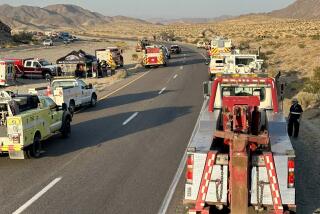Oil train derailment in Lynchburg, Va., raises safety questions
- Share via
A train hauling crude oil that derailed Wednesday near downtown Lynchburg, Va., sending a giant fireball and acrid smoke into the sky, raised further concerns about public safety as railroads sharply increase the amount of oil they transport.
About 15 tank cars jumped the track, several tumbling into the James River in the fifth major derailment and large-scale fire in North America involving an oil train in less than one year.
“We are all spring-loaded, looking for these kinds of accidents now,” said Brigham McCown, former chief of the Pipeline and Hazardous Material Safety Administration, the federal agency that oversees tank car safety. “The railroads are under a microscope.”
CSX Transportation, which operated the Chicago-to-Virginia freight train, said the fire erupted from three punctured cars after the 2:30 p.m. derailment.
It appeared that the train may have derailed after the track bed was washed away in the river, swollen from heavy rain, McCown said. Photographs at the accident site showed a section of earth had slipped into the river and tracks hung in the air like noodles. At least three tank cars ended up in the river, and blazing oil floated on the river for a while.
No injuries were reported and damage estimates were not immediately available. But several blocks of downtown Lynchburg, a city of about 250,000, were evacuated.
The National Transportation Safety Board sent a team of investigators to the site. The board had begun a major investigation of a late December crude rail accident in Casselton, N.D., which resulted in an evacuation of more than 1,000 residents.
Crude shipments by rail have shot up twenty-fivefold in the last several years as producers rush oil from newly developing shale fields to refineries along routes that are not served by pipelines. McCown said he believed the nation needed not only better tank cars and safer train operations, but also more pipelines.
The string of accidents began with the horrific fire triggered by the derailment of a runaway train in Lac-Megantic, Canada, last summer, in which 47 residents died and much of the downtown was destroyed. Other major accidents followed in Alabama, Alberta and North Dakota, along with minor ones in other states.
The safety concerns have triggered emergency rules by the Federal Railroad Administration, a move toward new safety standards for tank cars and a voluntary agreement with the railroad industry to reduce speeds and avoid sensitive urban corridors.
Downstream more than 100 miles from Lynchburg, a spokeswoman for the city of Richmond said utility officials stopped capturing water from the river as a precaution until the extent of environmental damage caused by the oil spill became clear. Instead, Richmond is relying on a backup canal for water. Lynchburg said the oil spill did not affect its water supply.
CSX said, “We are committed to fully supporting the emergency responders and other agencies, meeting the needs of the community and protecting the environment.”
More to Read
Sign up for Essential California
The most important California stories and recommendations in your inbox every morning.
You may occasionally receive promotional content from the Los Angeles Times.












